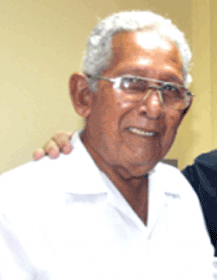Mr. Green was a well-qualified cabinet maker and carpenter from Belize City who came along with his family to reside in Corozal. He had a workshop with three employees and his son. They made all kinds of furniture and built several houses. Mr. Green taught me how to make a stool chair, and I participated in the making of a table using only lumber and wood glue; no nails or screws were applied.
One evening, my mother visited the family and I remember clearly when Mr. Green said to her: “Mary, I’ll have to leave my country and go to the U.S.”
My mother asked: “Why, Mr. Green?”
“I’m out of a job. The Mennonites have taken over the market, making hundreds of furniture and selling it at a cheap price. I am unable to compete with them,” he replied.
I have carried Mr. Green’s words for the past 60 years without understanding what was behind this unfair behavior until recently when I came across the following document, which I am now sharing with you, our dear readers of this column:
The Agreement with British Honduras
On December 18, 1957, the government of British Honduras finally extended to each of the three groups, the Altkolonier, the Commerfelder, and the Klcine Gemeinde, a uniformly worded privilegium that was satisfactory to them in all respects. That document issued to the Altkolonier reads as follows:
THIS AGREEMENT made the 18th day of December, 1957 between the Government of British Honduras and the undersigned representatives of the Reinland Mennonite Church of Chihuahua and Durango, Mexico:
Whereas members of the aforesaid Mennonite Church (which members are hereinafter called “the Mennonites”) are desirous of emigrating from Mexico and of settling in British Honduras:
2. Participation in Seguro Social has since been made voluntary for self-employed Mennonites. Employed persons must, however, be registered and contributions made on their behalf. The pressure to bring them into full participation continues.
3. Although it is quite possible – and common – for individuals and groups of Mennonites from Mexico to resettle in countries, such as Canada, that proffer no special status comparable to that provided by the Privilegium, their churches, for “diplomatic” reason, can neither sanction nor support such activity. To do so would be to suggest to the Mexican government, which is under constant pressure from “patriotic” elements, to accomplish the integration of the Mennonites, that they no longer lay great weight on the provisions of the Privilegium, and incursions upon it would then surely ensue.
And whereas such settlements will be to the mutual advantage of British Honduras and of the Mennonites:
And whereas it is desirable that there should be some Instrument setting forth in general terms the conditions under which the Mennonites will be permitted to settle in British Honduras:
Now Therefore This Agreement Witnesseth as follows –
1). The Government of British Honduras will grant to the Mennonites –
(a) the right to run their own Churches and schools, with their own teachers, in their own German language, according to their own religion;
(b) exemption from making the customary immigration deposits;
(c) protection of life and property in Peace and War;
(d) entire exemption from any military service;
(e) the privilege of affirming with the simple “yes” or “no” instead of making oaths in or out of the Courts;
(f) freedom of movement, according to law, to enter or leave the country with their money and property;
(g) the right to administer and invest the estates of their people, especially those of widows and orphans, in their own “Trust System,” called the “Waisenamt,” according to their own rules and regulations;
(h) the right to bring into British Honduras the old, infirm and invalid members of the Mennonite community provided that the individuals do not become a charge on the Government of British Honduras;
(i) exemption from any social security or compulsory system of insurance.
2. The Mennonites will –
(a) pay all costs and expenses incurred in establishing their settlement;
(b). bring into British Honduras capital investment in cash and kind amounting to five hundred thousand dollars more or less British Honduras currency;
(c) produce food not only for themselves but for local consumption and for the export market;
(d). conduct themselves as good citizens, and subject to this agreement, observe and obey the laws of British Honduras;
(e). pay all normal duties, taxes, fees, and charges by law established, such as customs duty, land tax, estate duty, property tax and income tax.
3. It is understood and agreed that the privileges granted by the government shall be enjoyed by the Mennonites and their descendants for all time so long as the Mennonites observe and fulfill the conditions imposed upon them by this agreement. In Witness whereof the parties hereto have signed two identical copies of this Instrument this 18th day of December, 1957.
Signed for and on behalf of the
Government of British Honduras.
Witness __________________
Signed for and on behalf of the Reinland Mennonite Church.
Witness: __________________
Sir Colin H. Thornley
Governor
Franz D. Rempel
Jacob J. Wiebe
H. W. Wiebe
Johan C. Wolfe
[email protected]
May 8, 2020
Finca Solana
Corozal Town

